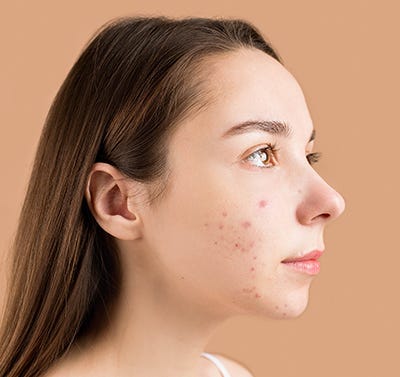Five nutrition hacks to support acne

Our research team has been working hard on decoding the skin’s microbiome, and producing easier, simpler ways to nourish and care for your skin. Recently, new evidence has emerged on how nutrition can help treat acne.
The team at Advanced Nutrition Programme™ reviewed published literature on the science behind acne and some of the factors that have been proven to help support this common skin concern. Here the team have recommended five simple hacks for a healthy-looking complexion. Let us break them down.
1. Cut back on dairy
Observation from studies on adolescents showed those that had increased acne consumed a high intake of milk and dairy products compared to those who did not consume any at all. This could be due to the hormones and bioactive molecules found in milk ¹. So, lowering your dairy intake could potentially help your acne clear up. Dairy products include milk, cheese, and butter. Be mindful of the foods you are eating that may contain dairy, as well as hidden dairy. Top tip: any allergies are bolded on an ingredient list on the back of pack.
Milk alternatives:
- Soy milk
- Oat milk
- Almond milk
Butter alternatives:
- Olive oil
- Coconut butter
- Nut butter
Additional alternatives:
- Coconut milk yoghurt
- Dark chocolate – ensure you check the label for any hidden sugars
2. Make green tea a part of your diet
Did you know that certain types of tea have shown to benefit skin health? In one study, 80 women from 25 to 45-years-old with moderate to severe acne drank decaffeinated green tea for four weeks. The results? There were significant differences in inflammation on the nose and on the chin ². Green tea also contains EGCG (Epigallocatechin) which has antioxidant and anti-inflammatory properties, which helps with both acne and oily skin ³. This means green tea could help lessen inflammation on your skin and help towards clearing your blemishes. Try swapping your usual brew for green decaffeinated tea and monitor the improvements of your skin over time.
3. Add Zinc to your nutrition plan
Zinc is an essential mineral found in all organs, tissues and fluids in the body and plays a pivotal role in a variety of biological processes. Although it plays such an important part in our health, it is not stored in the body and requires a regular dietary intake ⁴. Published literature shows that individuals with low zinc levels are more likely to have severe forms of acne ⁵. This suggests you should include more zinc in your diet. Seafood, red meat, nuts, legumes, and whole grains can be added to your weekly diet easily to increase your intake.
4. Vitamins A and E are your friends
Studies have shown that individuals with severe acne had lower concentrations of vitamins A and E than those with lower grade of acne ⁶. This shows there is a strong relationship between the two vitamins and the severity of the skin condition ⁶. You can include more vitamin A in your diet from beef liver, lamb liver, salmon, bluefin tuna, carrots, sweet potatoes, and butternut squash. For vitamin E, look to include sunflower seeds, almonds, hazelnut oil, and wheat germ oil to your daily regime.
5. Include more friendly bacteria in your diet
Acne is an inflammatory problem exacerbated by systemic inflammation and oxidative stress. Changes in the gut may influence levels of systemic inflammation. There is research to suggest that probiotics, (referred to as “good bacteria”) can help with that inflammation, which, in turn, can help target acne ⁷.
Probiotics have also been proven to help counter free radicals damage and increase antioxidant activity, which makes this a less attractive environment for acne ⁷. Basically, probiotics make acne less likely to want to set up camp on your skin.
So, how do you get probiotics in your body? You will find it them in probiotic yoghurt and fermented foods like sauerkraut, miso, and kimchi.
Based on the five healthy hacks above, it shows that by some small adjustments and swaps to your nutrition, it can have a positive impact on your skin to achieve a healthy-looking complexion.
- Dairy Intake and Acne Vulgaris: A Systematic Review and Meta-Analysis of 78,529 Children, Adolescents, and Young Adults. National Library of Medicine. February 2005.
- Does supplementation with green tea extract improve acne in post-adolescent women? National Library of Medicine. March 2016.
- Molecular understanding of Epigallocatechin gallate (EGCG) in cardiovascular and metabolic diseases . Science Direct. January 2017.
- Zinc in innate and adaptive tumor immunity. National Library of Medicine. November 2018.
- Correlation between the severity and type of acne lesions with serum zinc levels in patients with acne vulgaris . National Library of Medicine. July 2014.
- Does the plasma levels of vitamins A and E affect acne condition? National Library of Medicine. May 2006.
- The role of probiotics in acne and rosacea. Caitlin F. Porubsky, Alexandria B. Glass, Victoria Comeau, Christopher Buckley, Marcus B. Goodman and Mary-Margaret Kober. May 2018.
